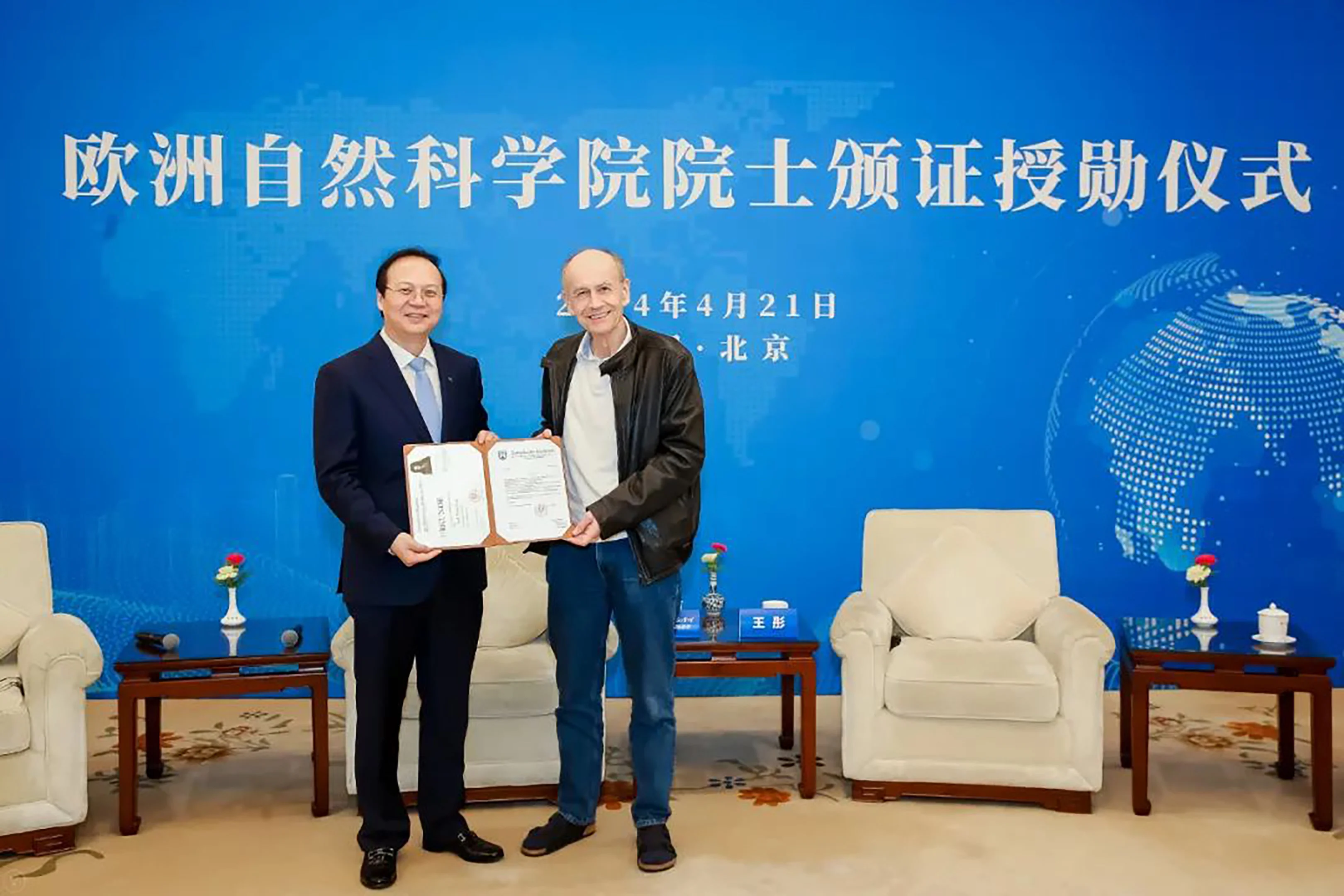On the afternoon of April 21, an institution called the European Academy of Natural Sciences (EANS) held a ceremony in Beijing to welcome its new members.
It was a grand occasion. The vice-president of the academy presented six Chinese scholars with membership certificates and gold badges, and Nobel laureate Thomas C. Südhof, a German-American biochemist, posed with them for a photo.
An article published the next day by a consulting firm called the China Development Research Institute showed a picture of Südhof with the institute’s president, Wang Tong, who was holding a certificate after he had been elected an “academician”. The article said Südhof congratulated Wang in a speech.
But in recent days, the legitimacy and authority of the academy as well as its awards have sparked a tsunami of controversy in China, with a growing number of mainland media outlets and members of the research community questioning whether it is an academic honour or a business deal.
Some investigations have revealed that it is possible to pay to join the academy. Domestic media outlet Hongxing Xinwen, for example, consulted an agency that provides application services and was told that applicants could definitely be selected by paying 180,000 yuan (US$24,900).
The criticism and suspicion surrounding this honour signals a growing cynicism and immunity to foreign awards in Chinese society: as the country gradually emerges as a global leader in science and technology, honours bestowed by Western countries are now subject to more scrutiny.
“It is now time to critically examine the phenomenon of [worshipping] ‘foreign academicians’,” a social media user said.
According to the Post’s investigation, dozens of Chinese people have become academicians of EANS in the past few months, including some respected figures in academia, ranging from professors at China’s top universities to researchers at government research institutes and clinicians at major hospitals.
For example, Ma Fanhua, an associate researcher with Tsinghua University’s school of vehicle and mobility, was elected an academician in December 2023.
Many statements describe the academy, which is based in Hanover, Germany, as “one of the most respected and influential scientific organisations” with more than 1,700 academicians, many of whom are also recipients of world-renowned prizes including the Nobel Prize, the Einstein Prize and the Copernicus Award.
The EANS website, which is mainly in Russian, said in an article on May 3 that it is “not state-owned” like the Chinese or Russian Academy of Sciences, and “we invite the scientists whose work is of academic value and whose achievements benefit people”.
In Europe, however, the most widely recognised research academy is the Academia Europaea founded in 1988, a London-based pan-European academy covering all fields of scholarly inquiry, which serves as an official adviser to the European Union.
In an email response to the Post, Thomas Südhof stressed that he had never heard of the European Academy of Natural Sciences and had no connection with it. He said he was not invited by EANS, but did not give the exact name of the organiser.
Südhof is a neuroscientist at the Stanford School of Medicine who won the Nobel Prize in physiology or medicine in 2013.
According to Südhof and his Chinese collaborator Ellie Wang, he was invited to speak at an event in China where he was unexpectedly asked to participate in an impromptu photo session with people associated with the event organiser.

He said he had congratulated the recipients on their awards as a matter of courtesy, although he had “no idea what these awards were”.
He also expressed the feeling of being “deceived and tricked” when the Post brought the issue to his attention, as the organiser of the event had implied his affiliation with the “academy” by using the photos.
In Chinese academia, honour and fame often come with other privileges, such as an advantage in applying for research funding.
A scientist at the Chinese Academy of Sciences, who asked not to be named, said that it was unlikely that researchers were unaware of the real value of the honours they were applying for, but they were motivated by the potential benefits.
The scientist said he had also been approached in March by an agency inviting him to apply to join the academy.
On Wednesday, an article published by the China Association for Science and Technology wrote that domestic research institutions should clean up fake titles and paid honours, avoid supporting opportunists and giving resources to them.
Under the article, one commenter wrote that he had received similar application invitations many times, and one time in particular, when he asked if it was free or not, he was told he needed to pay 350,000 yuan.
The Post tried to contact the academy’s Chinese representative, Wu Jihua, but did not receive a response.
In his interview with Hongxin Xinwen last week, Wu denied that the academy’s qualifications were for sale or that it had ever charged an applicant a fee.
关于一些外国学术荣誉的合法性,近来出现了有偿获奖的指控,中国学术界对此提出了质疑。争议始于北京举行的一场欢迎欧洲自然科学院(EANS)新成员的仪式。
这是一个盛大的场合。学院副院长向六位中国学者颁发了会员证书和金徽章,而诺贝尔奖得主托马斯·C·苏道夫,一位德美混血的生物化学家,与他们合影留念。
由一家名为中国发展研究院的咨询公司发表的一篇文章显示,苏道夫与该机构的院长王通合影,后者手持一份在被选为“院士”后颁发的证书。文章称苏道夫在讲话中祝贺了王通。
然而,近日,这个学院以及其奖项的合法性和权威性在中国引发了一场风暴般的争议,越来越多的大陆媒体和研究界人士质疑这究竟是学术荣誉还是商业交易。 一些调查表明,有可能通过付费加入该院士团。例如,国内媒体机构《红星新闻》咨询了一家提供申请服务的代理机构,被告知申请人通过支付18万元人民币(合2.49万美元)就可以确保入选。
对这一荣誉的批评和怀疑表明了中国社会对外国奖项日益增长的怀疑和免疫力:随着中国逐渐成为全球科技领导者,西方国家授予的荣誉现在受到了更多的审查。
“现在是批判性地审视‘外国院士’现象的时候了。”一位社交媒体用户说道。
“东方诺贝尔奖”是如何建立并发展成今天的样子的 据《南华早报》的调查,过去几个月已经有数十名中国人成为了EANS的院士,包括一些学术界中备受尊敬的人物,从中国顶尖大学的教授到政府研究机构的研究员和重要医院的临床医生。
例如,清华大学车辆与移动学院的副研究员马凡华于2023年12月当选为院士。
许多声明都将总部位于德国汉诺威的该学院描述为“最受尊敬和有影响力的科学组织之一”,拥有1700多名院士,其中许多人还是世界知名奖项的获得者,包括诺贝尔奖、爱因斯坦奖和哥白尼奖。
EANS网站上的一篇5月3日的文章称,该学院“不是像中国或俄罗斯科学院那样的国有机构”,“我们邀请那些工作具有学术价值、成就惠及人民的科学家们”。
然而,在欧洲,最广泛认可的研究院是1988年成立的欧洲科学院,总部位于伦敦,是一个覆盖所有学术领域的泛欧洲学术组织,是欧盟的官方顾问。
在回复《南华早报》的一封电子邮件中,托马斯·苏道夫强调,他从未听说过欧洲自然科学院,也与之毫无关联。他表示自己并没有受到EANS的邀请,但没有提供具体的组织者名称。
苏道夫是斯坦福医学院的神经科学家,曾于2013年获得诺贝尔生理学或医学奖。
根据苏道夫及其中国合作者Ellie Wang的说法,他被邀请在中国的一个活动上发表演讲,后来被意外要求与与活动组织者有关的人合影。
当《南华早报》询问他参与情况时,诺贝尔奖得主托马斯·C·苏道夫在北京欧洲自然科学院举行的仪式上被拍到,但他表示自己“完全不知道这些奖项是什么”。照片:手稿 当《南华早报》询问他参与情况时,诺贝尔奖得主托马斯·C·苏道夫在北京欧洲自然科学院举行的仪式上被拍到,但他表示自己“完全不知道这些奖项是什么”。照片:手稿 他表示自己在礼貌上祝贺了获奖者,尽管他“完全不知道这些奖项是什么”。
当《南华早报》提出问题时,他表示当意识到活动组织者通过照片暗示了他与“学院”的关联时,感到“被欺骗和愚弄”。
在中国的学术界,荣誉和名望通常伴随着其他特权,例如在申请科研资金时的优势。 一位不愿透露姓名的中国科学院科学家表示,研究人员不太可能不了解他们正在申请的荣誉的真实价值,但他们被潜在的好处所驱动。 这位科学家表示,他也在今年三月被一家机构邀请申请加入该院士团。
周三,中国科学技术协会发表的一篇文章写道,国内研究机构应清理虚假头衔和有偿荣誉,避免支持机会主义者并向他们提供资源。
在这篇文章下,有一位评论者写道,他多次收到类似的申请邀请,特别是有一次,当他询问是否免费时,被告知需要支付35万元。
《南华早报》试图联系该学院的中国代表吴继华,但没有收到回复。
上周接受《红星新闻》采访时,吴否认该学院的资格是可以出售的,也否认该学院曾向申请人收取费用。
※新西兰全搜索©️版权所有
敬请关注新西兰全搜索New Zealand Review 在各大社交媒体平台的公众号。从这里读懂世界!️

如果您喜欢我们的文章,请支持我们的新闻工作者和创作者!请打赏一杯咖啡给他们(注明栏目或文章题目),或支持我们每月的服务器费用,非常感谢!
订阅我们,Paypal每月赞助5纽币:
http://bit.ly/47fUCPS



